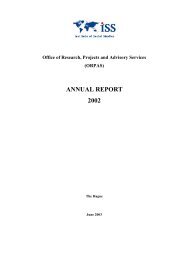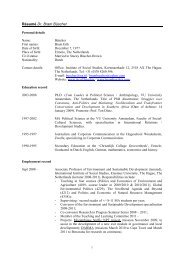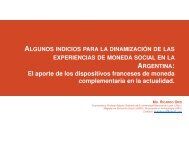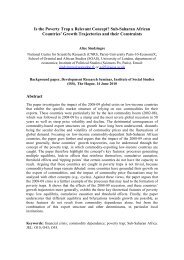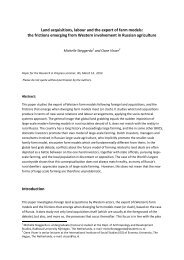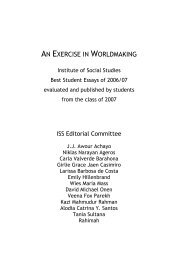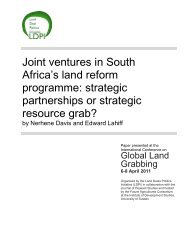AN EXERCISE IN WORLDMAKING 2009 - ISS
AN EXERCISE IN WORLDMAKING 2009 - ISS
AN EXERCISE IN WORLDMAKING 2009 - ISS
Create successful ePaper yourself
Turn your PDF publications into a flip-book with our unique Google optimized e-Paper software.
7<br />
Does the Aid Consensus Shift<br />
from Washington to the South?<br />
A Case Study of PRSP Ownership<br />
in Rwanda<br />
SABR<strong>IN</strong>A BR<strong>AN</strong>DT<br />
1 <strong>IN</strong>TRODUCTION<br />
The Paris Declaration on Aid Effectiveness (OECD 2005) introduced<br />
the principle of ownership, which implies that countries receiving official<br />
development aid are to exercise leadership and coordination on their development<br />
policies and projects. This principle seemed to announce the<br />
aftermath of the “one-size fits all” approaches to development by offering<br />
the possibility for context-based approaches.<br />
However, country ownership of the Poverty Reduction Strategy Papers<br />
(PRSPs) has been questioned because critics noticed them reflecting<br />
the neoliberal policies of the past. They argue the PRSPs lack alternative<br />
policies and are influenced or even directed by the international financial<br />
institutions (IFIs). Rather than context-based development policies, the<br />
contents of PRSPs seemed surprisingly similar across countries.<br />
This essay will examine the principle of ownership in the PRSP process<br />
in Rwanda. By analysing the content of the Economic Development<br />
and Poverty Reduction Strategy Paper (EDPRSP) for the period 2008-<br />
2012. The present essay considers whether the EDPRSP only represents<br />
morphed neoliberal policies that suit the Washington Consensus, or<br />
whether there is also some room for policies that could fit the alternative<br />
Latent South Consensus as proposed by Charles Gore (2000).<br />
The next section will provide the necessary background information;<br />
depicting the changes in the architecture of aid from the neoliberal<br />
Washington Consensus to the new Paris Declaration. The third section<br />
72




